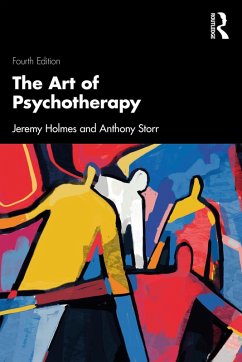Storr's The Art of Psychotherapy first appeared in 1979 and became an instant classic. After Storr's death, a third edition was rewritten and revised by Jeremy Holmes, and this fourth edition is a further up-to-date iteration.
Storr (1920-2001) and Holmes, both medical psychoanalytic psychotherapists, are 'elders' in the world of psychotherapy. Their eclectic, experienced and cultured voices offer students and psychotherapy practitioners clinical wisdom hard to find elsewhere. Their book expounds in a very practical way the issues entailed in setting up and maintaining a psychotherapeutic relationship and practice: how to introduce oneself, arrange one's consulting room, establish a contract, when and how to make 'interpretations'. The second half of the book deals with more general and often problematic issues, including how to align therapy in the light of diagnosis, working with 'difficult' patients, therapy termination, and the life course of a therapist, ending with a valedictory overview. In this fourth edition, Holmes has added a chapter on the scientific validation of psychotherapy, sections on tele- and e-therapy, non-binary gender and sexual identities and the impact of race and class on the therapeutic relationship.
This engaging, accessible and profound book is essential reading for psychotherapists, counsellors, psychiatrists and mental health practitioners in training or practice.
Storr (1920-2001) and Holmes, both medical psychoanalytic psychotherapists, are 'elders' in the world of psychotherapy. Their eclectic, experienced and cultured voices offer students and psychotherapy practitioners clinical wisdom hard to find elsewhere. Their book expounds in a very practical way the issues entailed in setting up and maintaining a psychotherapeutic relationship and practice: how to introduce oneself, arrange one's consulting room, establish a contract, when and how to make 'interpretations'. The second half of the book deals with more general and often problematic issues, including how to align therapy in the light of diagnosis, working with 'difficult' patients, therapy termination, and the life course of a therapist, ending with a valedictory overview. In this fourth edition, Holmes has added a chapter on the scientific validation of psychotherapy, sections on tele- and e-therapy, non-binary gender and sexual identities and the impact of race and class on the therapeutic relationship.
This engaging, accessible and profound book is essential reading for psychotherapists, counsellors, psychiatrists and mental health practitioners in training or practice.
Dieser Download kann aus rechtlichen Gründen nur mit Rechnungsadresse in A, B, BG, CY, CZ, D, DK, EW, E, FIN, F, GR, HR, H, IRL, I, LT, L, LR, M, NL, PL, P, R, S, SLO, SK ausgeliefert werden.


